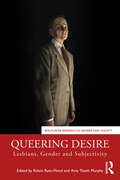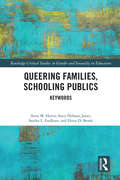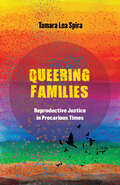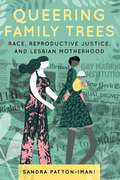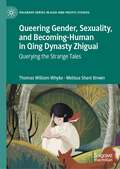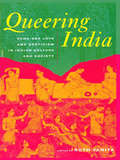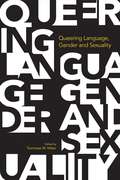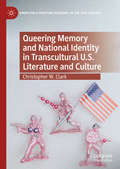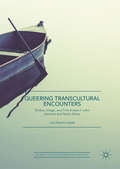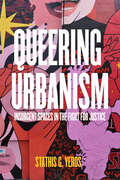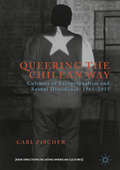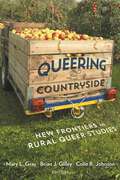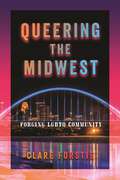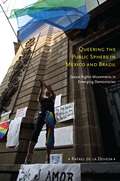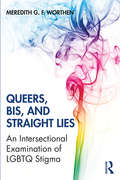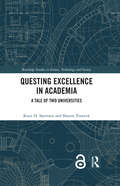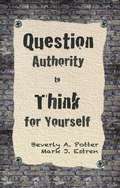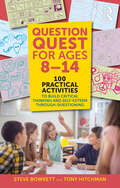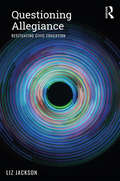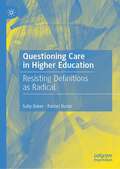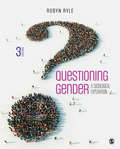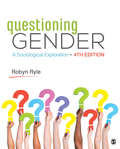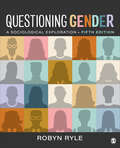- Table View
- List View
Queering Desire: Lesbians, Gender and Subjectivity (Routledge Research in Gender and Society)
by Róisín Ryan-Flood and Amy Tooth MurphyQueering Desire explores, with unprecedented interdisciplinary scope, contemporary configurations of lesbian, bi, queer women’s, and non-binary people’s experiences of identity and desire. Taking an intersectional feminist and trans-inclusive approach, and incorporating new and established identities such as non-binary, masculine of centre (MOC), butch, and femme, this collection examines how the changing landscape for gender and sexual identities impacts on queer culture in productive and transformative ways.Within queer studies, explorations of desire, longing, and eroticism have often neglected AFAB, transfeminine, and non-binary people’s experiences. Through 25 newly commissioned chapters, a diverse range of authors, from early career researchers to established scholars, stage conversations at the cutting edge of sexuality studies. Queering Desire advances our understanding of contemporary lesbian and queer desire from an inclusive perspective that is supportive of trans and non-binary identities.This innovative interdisciplinary collection is an excellent resource for scholars, undergraduate, and postgraduate students interested in gender, sexuality, and identity across a range of fields, such as queer studies, feminist theory, anthropology, media studies, sociology, psychology, history, and social theory. In foregrounding female and non-binary experiences, this book constitutes a timely intervention.
Queering Families, Schooling Publics: Keywords (Routledge Critical Studies in Gender and Sexuality in Education)
by Anne M. Harris Sandra L. Faulkner Stacy Holman Jones Eloise D. BrookAt a time of increasingly diverse and dynamic debates on the intersections of contemporary LGBTQ rights, trans* visibility, same-sex families, and sexualities education, there is surprisingly little writing on what it means to queer notions of family and kinship networks in global context. Building on the recent wave of scholarship on queerness in families and how families intersect with schools, schooling and educational institutions more broadly, this book considers how we are taught to enact family at home, at school and through the media, and how this pedagogy has shifted and changed over time. Conceived as a collection of keywords that take up the vocabulary of queerness, queering practices, and queer families, the authors employ a nuanced intersectional approach to connect the damaging and persistent invisibility of their subject to the complex and dominant and normalizing discourses of marriage and family. Offering post-structural, post-humanist, and new materialist perspectives on kinship and the family, this book moves the conversation forward by critically interrogating and expanding upon current knowledges about gender diversity, queer kinship, and pedagogy.
Queering Families: Reproductive Justice in Precarious Times (Reproductive Justice: A New Vision for the 21st Century)
by Tamara Lea SpiraEnvisioning queer futures where we lovingly wager everything for the world’s children, the planet, and all living beings against all odds, and in increasingly precarious times. Queering Families traces the shifting dominant meanings of queer family from the late twentieth century to today. With this book, Tamara Lea Spira highlights the growing embrace of normative family structures by LGBTQ+ movements—calling into question how many queers, once deemed unfit to parent, have become contradictory agents within the US empire’s racial and colonial agendas. Simultaneously, Queering Families celebrates the rich history of queer reproductive justice, from the radical movements of the 1970s through the present, led by Black, decolonial, and queer of color feminist activists. Ultimately, Spira argues that queering reproductive justice impels us to build communities of care to cherish and uphold the lives of those who, defying normativity’s violent stranglehold, are deemed to be unworthy of life. She issues the call to lovingly wager a future for the world’s children, the planet, and all living beings against all odds, and in increasingly perilous times.
Queering Family Trees: Race, Reproductive Justice, and Lesbian Motherhood
by Sandra Patton-ImaniArgues that significant barriers to family-making exist for lesbian mothers of color in the United StatesOne might be tempted, in the afterglow of Obergefell v. Hodges, to believe that the battle has been won, that gays and lesbians fought a tough fight and finally achieved equality in the United States through access to legal marriage. But that narrative tells only one version of a very complex story about family and citizenship.Queering Family Trees explores the lived experience of queer mothers in the United States, drawing on over one hundred interviews with African American, Latina, Native American, white, and Asian American lesbian mothers living in a range of socioeconomic circumstances to show how they have navigated family-making. While the legalization of same-sex marriage and adoption in 2015 has provided avenues toward equality for some couples, structural and economic barriers have meant that others—especially queer women of color who often have fewer financial resources—have not been able to access seemingly available “choices” such as second-parent adoptions, powers of attorney, and wills. Sandra Patton-Imani here argues that the virtual exclusion of lesbians of color from public narratives about LGBTQ families is crucial to maintaining the narrative that legal marriage for same-sex couples provides access to full equality as citizens. Through the lens of reproductive justice, Patton-Imani argues that the federal legalization of same-sex marriage reinforces existing structures of inequality grounded in race, gender, sexuality, and class. Queering Family Trees explores the lives of a critically erased segment of the queer population, demonstrating that the seemingly “color blind” solutions offered by marriage equality do not rectify such inequalities.
Queering Gender, Sexuality, and Becoming-Human in Qing Dynasty Zhiguai: Querying the Strange Tales (Palgrave Series in Asia and Pacific Studies)
by Melissa Shani Brown Thomas William WhykeThis book offers queer readings of Chinese Qing Dynasty zhiguai, ‘strange tales’, a genre featuring supernatural characters and events. In a unique approach interweaving Chinese philosophies alongside critical theories, this book explores tales which speak to contemporary debates around identity and power. Depictions of porous boundaries between humans and animals, transformations between genders, diverse sexualities, and contextually unusual masculinities and femininities, lend such tales to queer readings. Unlike previous scholarship on characters as allegorical figures or stories as morality tales, this book draws on queer theory, animal studies, feminism, and Deleuzian philosophy, to explore the ‘strange’ and its potential for social critique. Examining such tales enriches the scope of historic queer world literatures, offering culturally situated stories of relationships, desires, and ways of being, that both speak to and challenge contemporary debates.
Queering India: Same-Sex Love and Eroticism in Indian Culture and Society
by Ruth VanitaQueering India is the first book to provide an understanding of same-sex love and eroticism in Indian culture and society. The essays focus on pre-colonial, colonial, and post-colonial gay and lesbian life in India to provide a comprehensive look at a much neglected topic. The topics are wide-ranging, considering film, literature, popular culture, historical and religious texts, law and other aspects of life in India. Specifically, the essays cover such issues as Deepa Mehta's recent and controversial film, Fire, which focused on lesbian relationships in India; the Indian penal code which outlaws homosexual acts; a case of same-sex love and murder in colonial India; homophobic fiction and homoerotic advertising in current day India; and lesbian subtext in Hindu scripture. All of the essays are original to the collection. Queering India promises to change the way we understand India as well as gay and lesbian life and sexuality around the world.
Queering Language: Gender and Sexuality
by Tommaso M. MilaniThis volume showcases ten years of research on language, gender and sexuality informed by queer theory. In line with a queer dislike for any normalizing discourse and practice, the book gives a multi-faceted set of applications of queer theoretical ideas to linguistic analysis.
Queering Memory and National Identity in Transcultural U.S. Literature and Culture (American Literature Readings in the 21st Century)
by Christopher W. ClarkThis book examines the queer implications of memory and nationhood in transcultural U.S. literature and culture. Through an analysis of art and photography responding to the U.S. domestic response to 9/11, Iraq war fiction, representations of Abu Ghraib and Guantánamo Bay, and migrant fiction in the twenty-first century, Christopher W. Clark creates a queer archive of transcultural U.S. texts as a way of destabilizing heteronormativity and thinking about productive spaces of queer world-building. Drawing on the fields of transcultural memory, queer studies, and transculturalism, this book raises important questions of queer bodies and subjecthood. Clark traces their legacies through texts by Sinan Antoon, Mohamedou Ould Slahi among others, alongside film and photography that includes artists such as Nina Berman and Hasan Elahi. In all, the book queers forms of cultural memory and national identity to uncover the traces of injury but also spaces of regeneration.
Queering Transcultural Encounters: Bodies, Image, and Frenchness in Latin America and North Africa (Palgrave Studies in Globalization and Embodiment)
by Luis Navarro-AyalaIn a highly original and interdisciplinary work bridging French and Francophone studies, cultural studies, media studies, and gender and sexuality studies, Luis Navarro-Ayala examines the transnational queer body as a physical and symbolic entity intrinsically connected with space. Through a transcultural and intersectional approach to bodily representations, socioeconomic conditions, and postcolonial politics, Navarro-Ayala analyzes queerness and Frenchness in narratives from North Africa and Latin America, revealing that Frenchness is coded to represent a sexually deviant “Other.” France and Frenchness, in two distinct regions of the global South, have come to represent an imagined queer space enabling sexual exploration, even in social conditions that would have otherwise prevented queer agency.
Queering Urbanism: Insurgent Spaces in the Fight for Justice
by Stathis G. YerosA free ebook version of this title is available through Luminos, University of California Press’s Open Access publishing program. Visit www.luminosoa.org to learn more. Conflicts about space and access to resources have shaped queer histories from at least 1965 to the present. As spaces associated with middle-class homosexuality enter mainstream urbanity in the United States, cultural assimilation increasingly erases insurgent aspects of these social movements. This gentrification itself leads to queer displacement. Combining urban history, architectural critique, and queer and trans theories, Queering Urbanism traces these phenomena through the history of a network of sites in the San Francisco Bay Area. Within that urban landscape, Stathis Yeros investigates how queer people appropriated existing spaces, how they expressed their distinct identities through aesthetic forms, and why they mobilized the language of citizenship to shape place and secure space. Here the legacies of LGBTQ+ rights activism meet contemporary debates about the right to housing and urban life.
Queering the Chilean Way
by Carl FischerThis book examines and critiques the fact that Chile's claims to economic exceptionalism have been embodied, often quite aggressively, in a heterosexual, and primarily male, ideal. Despite the many shifts Chilean economics and politics have undergone over the past fifty years, the country's view of itself as a "model" in contrast to other Latin American countries has remained constant. By deploying an artistic, literary, and cinematic archive of queer figures from this period, this book draws parallels among the exceptionalisms of Chile's economic discourse, the subjects deemed most (and least) apt to embody it, and the maneuvers of its cultural production between local and global ideas of gender and politics to delineate its place in the world. Queering the Chilean Way thus sheds light on the sexual, economic, and aesthetic dimensions of exceptionalism--at its heart, a discourse of exclusion that often comprises a major element of nationalism--in Chile and throughout the Americas.
Queering the Countryside: New Frontiers in Rural Queer Studies (Intersections #11)
by Mary L. Gray Brian J. Gilley Colin R. JohnsonChoice Outstanding Academic Title of 2016Rural queer experience is often hidden or ignored, and presumed to be alienating, lacking, and incomplete without connections to a gay culture that exists in an urban elsewhere. Queering the Countryside offers the first comprehensive look at queer desires found in rural America from a genuinely multi-disciplinary perspective. This collection of original essays confronts the assumption that queer desires depend upon urban life for meaning.By considering rural queer life, the contributors challenge readers to explore queer experiences in ways that give greater context and texture to modern practices of identity formation. The book’s focus on understudied rural spaces throws into relief the overemphasis of urban locations and structures in the current political and theoretical work on queer sexualities and genders. Queering the Countryside highlights the need to rethink notions of “the closet” and “coming out” and the characterizations of non-urban sexualities and genders as “isolated” and in need of “outreach.” Contributors focus on a range of topics—some obvious, some delightfully unexpected—from the legacy of Matthew Shepard, to how heterosexuality is reproduced at the 4-H Club, to a look at sexual encounters at a truck stop, to a queer reading of TheWizard of Oz.A journey into an unexplored slice of life in rural America, Queering the Countryside offers a unique perspective on queer experience in the modern United States and Canada.
Queering the Midwest: Forging LGBTQ Community
by Clare ForstieHow LGBTQ community life in a small Midwestern city differs from that in larger cities with established gayborhoodsRiver City is a small, Midwestern, postindustrial city surrounded by green hills and farmland with a population of just over 50,000. Most River City residents are white, working-class Catholics, a demographic associated with conservative sexual politics. Yet LGBTQ residents of River City describe it as a progressive, welcoming, and safe space, with active LGBTQ youth groups and regular drag shows that test the capacity of bars.In this compelling examination of LGBTQ communities in seemingly “unfriendly” places, Queering the Midwest highlights the ambivalence of LGBTQ lives in the rural Midwest, where LGBTQ organizations and events occur occasionally but are generally not grounded in long-standing LGBTQ institutions. Drawing on in-depth interviews and ethnographic observation, Clare Forstie offers the story of a community that does not fit neatly into a narrative of progress or decline. Rather, this book reveals the contradictions of River City’s LGBTQ community, where people feel both safe and unnoticed, have a sense of belonging and persistent marginalization, and have friendships that do and don’t matter. These “ambivalent communities” in small Midwestern cities challenge the ways we think about LGBTQ communities and relationships and push us to embrace the contradictions, failures, and possibilities of LGBTQ communities across the American Midwest.
Queering the Public Sphere in Mexico and Brazil: Sexual Rights Movements in Emerging Democracies
by Rafael de la DehesaQueering the Public Sphere in Mexico and Brazil is a groundbreaking comparative analysis of the historical development and contemporary dynamics of LGBT activism in Latin America's two largest democracies. Rafael de la Dehesa focuses on the ways that LGBT activists have engaged with the state, particularly in alliance with political parties and through government health agencies in the wake of the AIDS crisis. He examines this engagement against the backdrop of the broader political transitions to democracy, the neoliberal transformation of state-civil society relations, and the gradual consolidation of sexual rights at the international level. His comparison highlights similarities between sexual rights movements in Mexico and Brazil, including a convergence on legislative priorities such as antidiscrimination laws and the legal recognition of same-sex couples. At the same time, de la Dehesa points to notable differences in the tactics deployed by activists and the coalitions brought to bear on the state. De la Dehesa studied the archives of activists, social-movement organizations, political parties, religious institutions, legislatures, and state agencies, and he interviewed hundreds of individuals, not only LGBT activists, but also feminists, AIDS and human-rights activists, party militants, journalists, academics, and state officials. He marshals his prodigious research to reveal the interplay between evolving representative institutions and LGBT activists' entry into the political public sphere in Latin America, offering a critical analysis of the possibilities opened by emerging democratic arrangements, as well as their limitations. At the same time, exploring activists' engagement with the international arena, he offers new insights into the diffusion and expression of transnational norms inscribing sexual rights within a broader project of liberal modernity. Queering the Public Sphere in Mexico and Brazil is a landmark examination of LGBT political mobilization.
Queers, Bis, and Straight Lies: An Intersectional Examination of LGBTQ Stigma
by Meredith G. WorthenThough there have been great advances for LGBTQ people in recent years, stigma, intolerance, and prejudice remain. Queers, Bis, and Straight Lies: An Intersectional Examination of LGBTQ Stigma offers an in-depth exploration of LGBTQ negativity through its ground-breaking use of Norm-Centered Stigma Theory (NCST), the first ever theory about stigma that is both testable and well-positioned in existing stigma scholarship. Based on research with more than 3,000 respondents, hetero-cis-normativity and intersectionality are highlighted as fundamental in understanding separate but interconnected discussions about LGBTQ individuals’ experiences with discrimination, harassment, and violence. With chapters dedicated to lesbian women, gay men, bisexual women, bisexual men, trans women, trans men, non-binary/genderqueer people, queer women, and queer men, Queers, Bis, and Straight Lies brings together empirically-driven findings that work toward dismantling "straight lies" in an innovative and impactful manner. Through its novel and critical approach, Queers, Bis, and Straight Lies is the ideal resource for those who want to learn about LGBTQ stigma more broadly and for those who seek a nuanced, theory-driven, and intersectional examination of how LGBTQ prejudices and prejudicial experiences differ by gender identity, sexual identity, race/ethnicity, and class.
Questing Excellence in Academia: A Tale of Two Universities (Routledge Studies in Science, Technology and Society #1)
by Sharon Traweek Knut H. SørensenUnlike almost most other studies of neoliberal universities and academic capitalism this book ethnographically explores and interprets those transformations and their contradictions empirically in the everyday practices of students, faculty members, and administrators at two public universities: NTNU in Norway and UCLA in California. Differently situated in global political economies, both are ambitious, prosperous campuses. The book refl exively examines their disturbing disputes about quality, competition, and innovation. It argues that some academic, bureaucratic, and corporate university governance practices are both unsustainable and undermining what some university students and faculty already do well: circulate interdisciplinary knowledge and its making globally across the diasporic domains of academia, society, industry, and government while addressing the world’s immediate challenges: power, inequities, and sustainability. It shows the important, strategic work of domesticating, co- morphing, and meshworking at the faultlines of emerging knowledge. This book is for students, faculty, society members, and policy makers who want to engage more effectively with contemporary universities that increasingly serve as busy crossroads for sharing ideas and how to make them. It will be of interest to workers and scholars in the interdisciplinary fi elds of higher education studies, critical university studies, and critical public infrastructure studies, plus science, technology, and society studies.
Question Authority; Think for Yourself
by Mark James Estren Beverly A. PotterWe have freedom of speech but we're afraid to speak. Our lives have become subjected to PC tyranny-a constant fear of "offending" someone. We think that we are independent and that it is the other guy who is influenced, brain washed, duped, persuaded. We feel like we think for ourselves. How can we "feel" otherwise? There's no way to know because countless influences and interactions have molded us.We're members of various groups-circles of friends, family, professional groups, hobby group, and workplace groups. Groups have a way of developing a view that it imposes with a kind of group-think. We want to belong, to be liked and included so go along and get along. We don't make waves by questioning. If we have a different view, we keep it to ourselves. Why rock the boat?Thinking for yourself is not so easy. When encountering an argument to a long held opinion or a wild idea, we use critical thinking to evaluate it, as we were taught to do in school. The problem is that critical thinking is critical. It focuses our thinking on the negative-what doesn't work, what's wrong with the idea-and encourages my-side thinking where we evaluate evidence in a way that favors our beliefs and entraps us into closed-mindedness. Thinking for yourself requires open-mindedness. Open-mindedness is being receptive and, when the issue is important, calls for actively searching for evidence against your beliefs.Thinking is not driven by answers but by questions. Every intellectual field is born out of a cluster of questions to which answers are needed. Had no questions been asked by those who laid the foundation for a field - for example, Physics or Biology - the field would never have been developed.We define tasks, express problems and delineate issues with questions. Answers signal an end point and stop thought, except when an answer generates a further question.Timothy Leary said, "to think for yourself you must question authority". To think, you must question. To think through or rethink anything, one must ask questions that stimulate thought. The quality of your questions determines the quality of your thinking.Thinking begins within some content when questions are generated. No questions equals no understanding. To engage in thinking through your content you must stimulate your thinking with questions that lead to further questions.Our own opinions is one authority we should frequently question. Times change. We change. Perspectives and values change. Book explores how opinions and values we held in the past need periodic evaluation and challenge. Independent thinkers evolve and need to shed the shackles of old views and opinions.Ridicule is the strongest weapon for pressing us to conform. It is a kind of bait that if you go for it will entrap you in an argument you can't win and leave you looking ridiculous and deflated. Question Authority; Think for Yourself offers techniques, with examples, of how to deflect attacks, side-tracks, and put-downs.If you've bitten your tongue and later wished you'd spoken up and not been cowed into silence by a mocking co-worker when you revealed a "politically incorrect" viewpoint, you'll find much of interest in Question Authority; Think for Yourself .
Question Quest for Ages 8-14: 100 Practical Activities to Build Critical Thinking and Self-Esteem Through Questioning
by Steve Bowkett Tony HitchmanThe ability to ask incisive questions is a powerful skill set that children can acquire and develop if the classroom and whole-school environments support it. This essential book offers a range of engaging and inclusive activities that promotes children’s questioning and feeds their natural sense of curiosity and wonder. Question Quest explores the various types of questions that can be asked in a number of educational contexts, from the point of view of both teachers and pupils. Packed with 100 practical activities, the book seeks to boost children’s self-confidence in asking questions and provides the tools to establish a ‘questioning classroom’ where asking questions is encouraged and celebrated in order to enhance children’s learning. With clear and practical explanations, the authors argue how questioning is an intelligent behaviour that is essential in nurturing children’s innate desire to learn constantly. Topics covered include: Establishing a questioning classroom Questioning and creativity Questions and creative writing Conducting a discussion Philosophical enquiry Questioning and life coaching This book is a key resource for any school, teacher or parent looking to foster and develop critical thinking skills in children and young people.
Questioning Allegiance: Resituating Civic Education
by Liz JacksonEducation about living in society and in the world is a vital task of schools. Yet such civic education is not always critically examined, and few among us have been encouraged to reflect on our civic education experiences. Around the world, one’s civic education most often looks like a black box. How it works is unclear. When human harm, violence, and oppression can be seen in a wide variety of contexts, it is worth critically examining civic education. Could it be that civic education is not playing a helpful role in society? Can it be done differently and better? As one reflects on the contemporary social world, it is helpful to examine the assumptions surrounding education for living together, to think about current modes and possible alternatives. Otherwise, one might end up promoting allegiance to civic and partisan entities which are themselves black boxes (the ‘nation’, the ‘people’), failing to notice when and how what goes on in civic education is morally questionable. This book aims to elucidate some of the black box of civic education, and focuses on some of its main operations across contexts. Offering a new framework for students and academics, this book questions existing thinking and shifts the focus of attention from the right balance to strike between local, national, and global allegiances to the more fundamental question of what counts as ‘local’, ‘national’, and ‘global’, and what might be involved in cultivating allegiances to them. It looks at allegiance to not just transnational but also sub-global ‘civilisations’ and it problematises the notion of the ‘local community’ in new ways.
Questioning Care in Higher Education: Resisting Definitions as Radical
by Rachel Burke Sally BakerThis book explores questions of care in higher education. Using Joan Tronto’s seven signs that institutions are not caring well, the authors examine whether students and staff consider universities to be caring institutions. As such, they outline how universities systematically, structurally, and actively ‘undercare’ when it comes to supporting students and staff, a phenomenon which was amplified by the COVID-19 pandemic. Drawing on scholarly ideas from the sociology of care, higher education, social justice, and feminist critique, and in dialogue with empirical insights gathered with people who work and study in universities in Australia, South Africa, and the UK, the book questions why people care, as well as why adopting a caring position in higher education can be viewed as radical. The authors conclude by asking what we can do to counter that view by thinking carefully about the purpose, power, and plurality of care, before imagining how we can create more caring universities.
Questioning Gender: A Sociological Exploration
by Robyn R. RyleWith content organized around big questions about gender, Questioning Gender: A Sociological Exploration serves as a point-of-departure for conversations about gender, and as a resource for exploring answers to many of those questions. Rather than providing definitive answers, this unique book exposes readers to new material that will lead them to question their assumptions.
Questioning Gender: A Sociological Exploration
by Robyn R. RyleWith content organized around big questions about gender, Questioning Gender: A Sociological Exploration serves as a point-of-departure for conversations about gender, and as a resource for exploring answers to many of those questions. Rather than providing definitive answers, this unique book exposes readers to new material that will lead them to question their assumptions.
Questioning Gender: A Sociological Exploration
by Robyn R. RyleQuestioning Gender: A Sociological Exploration serves as a point-of-departure for productive conversations and questions about gender and as a resource for exploring answers to many of those questions. Rather than providing definitive answers, this book takes a global approach and aims to challenge readers&’ preconceptions about gender and to demonstrate how gender as a system creates and reinforces inequality. Author Robyn Ryle uses both historical and cross-cultural approaches to help readers understand the socially constructed nature of gender. With a focus on contemporary topics, including the #MeToo movement, sexual harassment in the workplace, and the gender wage gap, readers will be prompted to think critically about past, present, and future gender-related issues.
Questioning Gender: A Sociological Exploration
by Robyn R. RyleQuestioning Gender: A Sociological Exploration serves as a point-of-departure for productive conversations and questions about gender and as a resource for exploring answers to many of those questions. Rather than providing definitive answers, this book takes a global approach and aims to challenge readers&’ preconceptions about gender and to demonstrate how gender as a system creates and reinforces inequality. Author Robyn Ryle uses both historical and cross-cultural approaches to help readers understand the socially constructed nature of gender. With a focus on contemporary topics, including the #MeToo movement, sexual harassment in the workplace, and the gender wage gap, readers will be prompted to think critically about past, present, and future gender-related issues.
Questioning Gender: A Sociological Exploration
by Robyn R. RyleQuestioning Gender: A Sociological Exploration aims to spark productive conversations and questions about gender and serve as a resource for exploring answers to many of those questions. Rather than providing definitive answers, this book aims to challenge students’ preconceptions about gender and demonstrate how gender as a system creates and reinforces inequality. Taking a global approach, author Robyn Ryle uses both historical and cross-cultural approaches to help students understand the socially constructed nature of gender. Through examining contemporary topics, including the #MeToo movement, sexual harassment in the workplace, and the gender wage gap, students will be prompted to think critically about past, present, and future gender-related issues. The Fifth Edition has been updated with expanded coverage of disability as it relates to gender, discussion of issues related to transgender and nonbinary people, and examination of the COVID-19 pandemic′s gender-related effects, as well as updated data throughout.
